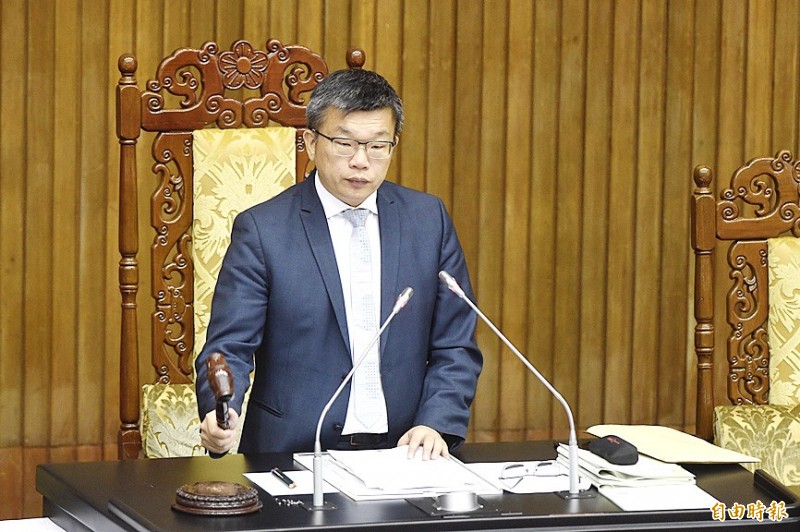《TAIPEI TIMES》 ‘National dignity’ rules passed

Deputy Legislative Speaker Tsai Chi-chang bangs his gavel in the Legislative Yuan in Taipei yesterday to mark the passage of amendments to the Act Governing Relations Between the People of the Taiwan Area and the Mainland Area. Photo: George Tsorng, Taipei Times
BROADER SCOPE: The passed version of the amendments apply to retired officers ranked major general and above, and expand the restricted area beyond China
By Huang Hsin-po and Sherry Hsiao / Staff reporter, with staff writer and CNA
The Legislative Yuan at an extraordinary session yesterday passed a third reading of draft amendments to the Act Governing Relations Between the People of the Taiwan Area and the Mainland Area (台灣地區與大陸地區人民關係條例) that could see the monthly pensions of retired officials or military officers revoked for engaging in behavior that “impairs national dignity” at celebrations or events hosted by the Chinese Community Party, the Chinese government, or China-based military or political groups.
Such behavior includes saluting the Chinese national flag or emblem, and singing the Chinese national anthem, according to the draft amendments.
The amendments were proposed after 32 retired generals in November 2016 attended an event in China marking the 150th anniversary of the birth of Sun Yat-sen (孫中山), at which they listened to Chinese President Xi Jinping (習近平) give a speech and stood during a rendition of the Chinese national anthem.
In a version of the amendments that passed a preliminary review, only the retired heads and deputies of government agencies associated with national defense, foreign affairs, China affairs and national security; retired heads of intelligence agencies; and retired officers ranked lieutenant general or above would be subject to the restrictions.
However, before a vote in the second reading, the Democratic Progressive Party (DPP) caucus proposed a revision motion to have the amendments apply to retired officers ranked major general and above, and to expand the restricted area beyond China.
The penalties were also raised from the amount that the DPP caucus originally proposed.
In the revised version, which passed yesterday, offenders could lose half to all of their monthly pensions for five years, as well as their medals, military orders, licenses and certificates.
Severe breaches could result in the permanent cancelation of monthly pensions, or the return of payments that have already been made.
Offenders who opted for a one-time pension payment would be fined NT$2 million to NT$10 million (US$64,247 to US$321,234).
Whereas three years was the “standard” time frame for travel restrictions, with government agencies reserving the right to extend or shorten that period, the passed version makes three years the minimum, and only allows agencies to prolong, but not shorten, the restrictions.
To avoid confusion over the words “national secrets” in the act, which some had interpreted as only referring to “classified national security information” regulated by the Classified National Security Information Protection Act (國家機密保護法), the amendments have changed the words “national secrets” to “national security, interests or secrets.”
Under current regulations, the mayors, county commissioners and government officials would need the approval of the Ministry of the Interior, in conjunction with the National Security Bureau, the Ministry of Justice and the Mainland Affairs Council’s review committee, before traveling to China.
Under the amendments, government officials would also be required, upon returning to Taiwan, to report to the agency they serve, with the mayors of special municipalities reporting to the Executive Yuan, and the mayors of other cities and county commissioners to the Ministry of the Interior.
Retired or former employees of government agencies associated with national defense, foreign affairs, technology, intelligence or China affairs agencies and who worked with national security, interests or secrets could also be required by the agency to report before and after travel to China, according to the amendments.
新聞來源:TAIPEI TIMES



















